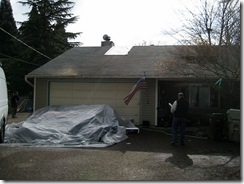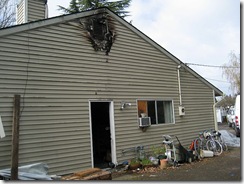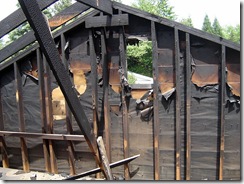"I survived!" is about as succinct as a summary could be of last week. We had close to 40 campers from Petersburg, making a grand total of about 70 at camp. Five of those from Petersburg went home on Friday due to some kind of flu-like illness.
Of the 70, around 10 were from Adventist families. I'd guess another 20 to 30 were from actively Christian families. So that left probably half the campers with no real experience of God.
I was given the task of giving a 15-20 minute talk each day to four separate groups through the day in a class called Life Skills. The overall theme was "Royalty," as in each person is a child of God. Each day emphasized a particular attribute. Based on the composition of the campers, my goal was to simply communicate this basic theme: God loves you. God cares for you. By choosing to belong to God's family, you can have hope for the future.
Monday's theme was Courage. My talk was based on the story of Gideon and how he developed courage by getting to know God.
Tuesday's theme was Mistakes and Recovery. My talk on this day was based on the story of the Prodigal and the Father: recognizing mistakes and choosing to return to God.
Wednesday's theme was Communication and Relationships. My talk was a highly condensed overview of the Great Controversy theme: God wants to communicate the truth about him so that we will choose to belong to his family.
Thursday's theme was Attitudes. My talk was based on the story of Paul and Silas in the jail at Philippi. I read some of the attitudes God would like us to have as found in Philippians and how only God can develop those attitudes in us.
Friday's theme was Strengths and Weaknesses. Since the Olympics began on this day, I used the team relay as one illustration of strengths and weaknesses. I also talked about the parable of the talents and of God's family as a body to show how when we work together, strengths can cover and compensate for weaknesses.
On Saturday morning the generator failed to turn on. That caused some changes in plans. I was asked to give another short talk. This was the shortest notice I've ever had in preparing a sermon. I decided to talk about what I know most about -- my own journey. I worked my story around 1 John 2:15-17, John 6:28-29, Hebrews 12:1-2, and 1 John 5:13-15, 20-21. The theme and appeal once again was for the campers to choose to belong to God's family above all else.
Even though the weather forecast seemed to call for rain towards the end of the week, we only experienced a few sprinkles on just one of the days. Three of the days was brilliant sunshine and things even got quite hot.
The other classes included water skiing, canoeing and kayaking, drawing and painting, string art, fire building, archery, dough and plaster art, native art, puppetry, physical education, and probably some others that I forgot. Quite a few of the campers completed requirements to receive Pathfinder honors.
A traditional hike over the mountain to the other side of the island occurred Saturday afternoon. It was a moderate hike (for me) through the rainforest, full of trees, biting insects, and devil's club. I was able to carry the camera in one hand throughout the hike, so it wasn't that difficult. But for some of the younger kids, I'm sure it wasn't easy. There was one place where I slipped and brushed my hand against some devil's club. By the time I returned to camp a couple hours later, my finger was starting to swell and itch. Fortunately I didn't get any of the thorns embedded into my fingers. An application of Benadryl cream fixed the swelling. Some others weren't so lucky. They had to pick out the thorns. I was happy to know that I could keep up with, and was even faster than the kids. Even though I'm getting closer to 40 all the time, I can still keep up.
Most of the kids were pretty good to work with. There were a few though, that seemed intent on causing trouble. Someone plugged up the sewer on the boys' side with foreign objects. One of the toilets never did flush quite right after that, even after taking apart the pipes. There were a few that seemed to just be angry at the world through much of the week.
This was the first time I'd ever spent a week on the staff side of summer camp. I have a huge amount of respect for the staff, but especially for the counselors. I think there is a special gift of patience that counselors have. One counselor observed that if a person wants to really experience mission work, do a stint at a summer camp -- it can make building a church or preaching an evangelistic series seem like a piece of cake.
During the week, a couple of staff went home early (already planned). But a couple others fell sick to the point where they couldn't work. The staff was already stretched beyond what was reasonable and this last little bit seemed to be the breaking point. The last few days seemed particularly stressful and tense, both among the staff and with the campers.
Would I do this again? I'd have to answer yes.
(Click on image to enter gallery.)






























